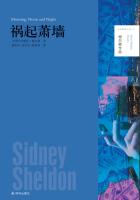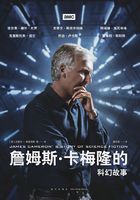When Mr. Hawbury joined his guests in the breakfast-room, the strange contrast of character between them which he had noticed already was impressed on his mind more strongly than ever. One of them sat at the well-spread table, hungry and happy, ranging from dish to dish, and declaring that he had never made such a breakfast in his life. The other sat apart at the window; his cup thanklessly deserted before it was empty, his meat left ungraciously half-eaten on his plate. The doctor's morning greeting to the two accurately expressed the differing impressions which they had produced on his mind.
He clapped Allan on the shoulder, and saluted him with a joke. He bowed constrainedly to Midwinter, and said, "I am afraid you have not recovered the fatigues of the night."
"It's not the night, doctor, that has damped his spirits," said Allan. "It's something I have been telling him. It is not my fault, mind. If I had only known beforehand that he believed in dreams, I wouldn't have opened my lips."
"Dreams?" repeated the doctor, looking at Midwinter directly, and addressing him under a mistaken impression of the meaning of Allan's words. "With your constitution, you ought to be well used to dreaming by this time."
"This way, doctor; you have taken the wrong turning!" cried Allan. "I'm the dreamer, not he. Don't look astonished; it wasn't in this comfortable house; it was on board that confounded timber-ship. The fact is, I fell asleep just before you took us off the wreck; and it's not to be denied that I had a very ugly dream. Well, when we got back here-"
"Why do you trouble Mr. Hawbury about a matter that cannot possibly interest him?" asked Midwinter, speaking for the first time, and speaking very impatiently.
"I beg your pardon," returned the doctor, rather sharply; "so far as I have heard, the matter does interest me."
"That's right, doctor!" said Allan. "Be interested, I beg and pray; I want you to clear his head of the nonsense he has got in it now. What do you think? He will have it that my dream is a warning to me to avoid certain people; and he actually persists in saying that one of those people is-himself! Did you ever hear the like of it? I took great pains; I explained the whole thing to him. I said, warning be hanged; it's all indigestion! You don't know what I ate and drank at the doctor's supper-table; I do. Do you think he would listen to me? Not he. You try him next; you're a professional man, and he must listen to you. Be a good fellow, doctor, and give me a certificate of indigestion; I'll show you my tongue with pleasure."
"The sight of your face is quite enough," said Mr. Hawbury. "I certify, on the spot, that you never had such a thing as an indigestion in your life. Let's hear about the dream, and see what we can make of it, if you have no objection, that is to say."
Allan pointed at Midwinter with his fork.
"Apply to my friend, there," he said; "he has got a much better account of it than I can give you. If you'll believe me, he took it all down in writing from my own lips; and he made me sign it at the end, as if it was my 'last dying speech and confession' before I went to the gallows. Out with it, old boy-I saw you put it in your pocket-book-out with it!"
"Are you really in earnest?" asked Midwinter, producing his pocketbook with a reluctance which was almost offensive under the circumstances, for it implied distrust of the doctor in the doctor's own house.
Mr. Hawbury's color rose. "Pray don't show it to me, if you feel the least unwillingness," he said, with the elaborate politeness of an offended man.
"Stuff and nonsense!" cried Allan. "Throw it over here!"
Instead of complying with that characteristic request, Midwinter took the paper from the pocket-book, and, leaving his place, approached Mr. Hawbury. "I beg your pardon," he said, as he offered the doctor the manuscript with his own hand. His eyes dropped to the ground, and his face darkened, while he made the apology. "A secret, sullen fellow," thought the doctor, thanking him with formal civility; "his friend is worth ten thousand of him." Midwinter went back to the window, and sat down again in silence, with the old impenetrable resignation which had once puzzled Mr. Brock.
"Read that, doctor," said Allan, as Mr. Hawbury opened the written paper. "It's not told in my roundabout way; but there's nothing added to it, and nothing taken away. It's exactly what I dreamed, and exactly what I should have written myself, if I had thought the thing worth putting down on paper, and if I had had the knack of writing-which," concluded Allan, composedly stirring his coffee, "I haven't, except it's letters; and I rattle them off in no time."
Mr. Hawbury spread the manuscript before him on the breakfast-table, and read these lines:
"ALLAN ARMADALE'S DREAM.
"Early on the morning of June the first, eighteen hundred and fifty-one, I found myself (through circumstances which it is not important to mention in this place) left alone with a friend of mine-a young man about my own age-on board the French timber-ship named La Grace de Dieu, which ship then lay wrecked in the channel of the Sound between the main-land of the Isle of Man and the islet called the Calf. Having not been in bed the previous night, and feeling overcome by fatigue, I fell asleep on the deck of the vessel. I was in my usual good health at the time, and the morning was far enough advanced for the sun to have risen. Under these circumstances, and at that period of the day, I passed from sleeping to dreaming. As clearly as I can recollect it, after the lapse of a few hours, this was the succession of events presented to me by the dream:
"1. The first event of which I was conscious was the appearance of my father. He took me silently by the hand; and we found ourselves in the cabin of a ship.
"2. Water rose slowly over us in the cabin; and I and my father sank through the water together.
"3. An interval of oblivion followed; and then the sense came to me of being left alone in the darkness.
"4. I waited.
"5. The darkness opened, and showed me the vision-as in a picture-of a broad, lonely pool, surrounded by open ground. Above the farther margin of the pool I saw the cloudless western sky, red with the light of sunset.
"6. On the near margin of the pool there stood the Shadow of a Woman.
"7. It was the shadow only. No indication was visible to me by which I could identify it, or compare it with any living creature. The long robe showed me that it was the shadow of a woman, and showed me nothing more.
"8. The darkness closed again-remained with me for an interval-and opened for the second time.
"9. I found myself in a room, standing before a long window. The only object of furniture or of ornament that I saw (or that I can now remember having seen) was a little statue placed near me. The window opened on a lawn and flower-garden; and the rain was pattering heavily against the glass.
"10. I was not alone in the room. Standing opposite to me at the window was the Shadow of a Man.
"11. I saw no more of it; I knew no more of it than I saw and knew of the shadow of the woman. But the shadow of the man moved. It stretched out its arm toward the statue; and the statue fell in fragments on the floor.
"12. With a confused sensation in me, which was partly anger and partly distress, I stooped to look at the fragments. When I rose again, the Shadow had vanished, and I saw no more.
"13. The darkness opened for the third time, and showed me the Shadow of the Woman and the Shadow of the Man together.
"14. No surrounding scene (or none that I can now call to mind) was visible to me.
"15. The Man-Shadow was the nearest; the Woman-Shadow stood back. From where she stood, there came a sound as of the pouring of a liquid softly. I saw her touch the shadow of the man with one hand, and with the other give him a glass. He took the glass, and gave it to me. In the moment when I put it to my lips, a deadly faintness mastered me from head to foot. When I came to my senses again, the Shadows had vanished, and the third vision was at an end.
"16. The darkness closed over me again; and the interval of oblivion followed.
"17. I was conscious of nothing more, till I felt the morning sun shine on my face, and heard my friend tell me that I had awakened from a dream… ."
After reading the narrative attentively to the last line (under which appeared Allan's signature), the doctor looked across the breakfast-table at Midwinter, and tapped his fingers on the manuscript with a satirical smile.
"Many men, many opinions," he said. "I don't agree with either of you about this dream. Your theory," he added, looking at Allan, with a smile, "we have disposed of already: the supper that you can't digest is a supper which has yet to be discovered. My theory we will come to presently; your friend's theory claims attention first." He turned again to Midwinter, with his anticipated triumph over a man whom he disliked a little too plainly visible in his face and manner. "If I understand rightly," he went on, "you believe that this dream is a warning! supernaturally addressed to Mr. Armadale, of dangerous events that are threatening him, and of dangerous people connected with those events whom he would do wisely to avoid. May I inquire whether you have arrived at this conclusion as an habitual believer in dreams, or as having reasons of your own for attaching especial importance to this one dream in particular?"
"You have stated what my conviction is quite accurately," returned Midwinter, chafing under the doctor's looks and tones. "Excuse me if I ask you to be satisfied with that admission, and to let me keep my reasons to myself."
"That's exactly what he said to me," interposed Allan. "I don't believe he has got any reasons at all."
"Gently! gently!" said Mr. Hawbury. "We can discuss the subject without intruding ourselves into anybody's secrets. Let us come to my own method of dealing with the dream next. Mr. Midwinter will probably not be surprised to hear that I look at this matter from an essentially practical point of view."
"I shall not be at all surprised," retorted Midwinter. "The view of a medical man, when he has a problem in humanity to solve, seldom ranges beyond the point of his dissecting-knife."
The doctor was a little nettled on his side. "Our limits are not quite so narrow as that," he said; "but I willingly grant you that there are some articles of your faith in which we doctors don't believe. For example, we don't believe that a reasonable man is justified in attaching a supernatural interpretation to any phenomenon which comes within the range of his senses, until he has certainly ascertained that there is no such thing as a natural explanation of it to be found in the first instance."
"Come; that's fair enough, I'm sure," exclaimed Allan. "He hit you hard with the 'dissecting-knife,' doctor; and now you have hit him back again with your 'natural explanation.' Let's have it."
"By all means," said Mr. Hawbury. "Here it is. There is nothing at all extraordinary in my theory of dreams: it is the theory accepted by the great mass of my profession. A dream is the reproduction, in the sleeping state of the brain, of images and impressions produced on it in the waking state; and this reproduction is more or less involved, imperfect, or contradictory, as the action of certain faculties in the dreamer is controlled more or less completely by the influence of sleep. Without inquiring further into this latter part of the subject-a very curious and interesting part of it-let us take the theory, roughly and generally, as I have just stated it, and apply it at once to the dream now under consideration." He took up the written paper from the table, and dropped the formal tone (as of a lecturer addressing an audience) into which he had insensibly fallen. "I see one event already in this dream," he resumed, "which I know to be the reproduction of a waking impression produced on Mr. Armadale in my own presence. If he will only help me by exerting his memory, I don't despair of tracing back the whole succession of events set down here to something that he has said or thought, or seen or done, in the four-and-twenty hours, or less, which preceded his falling asleep on the deck of the timber-ship."
"I'll exert my memory with the greatest pleasure," said Allan. "Where shall we start from?"
"Start by telling me what you did yesterday, before I met you and your friend on the road to this place," replied Mr. Hawbury. "We will say, you got up and had your breakfast. What next?"
"We took a carriage next," said Allan, "and drove from Castletown to Douglas to see my old friend, Mr. Brock, off by the steamer to Liverpool. We came back to Castletown and separated at the hotel door. Midwinter went into the house, and I went on to my yacht in the harbor. By-the-bye, doctor, remember you have promised to go cruising with us before we leave the Isle of Man."
"Many thanks; but suppose we keep to the matter in hand. What next?"
Allan hesitated. In both senses of the word his mind was at sea already.
"What did you do on board the yacht?"
"Oh, I know! I put the cabin to rights-thoroughly to rights. I give you my word of honor, I turned every blessed thing topsy-turvy. And my friend there came off in a shore-boat and helped me. Talking of boats, I have never asked you yet whether your boat came to any harm last night. If there's any damage done, I insist on being allowed to repair it."
The doctor abandoned all further attempts at the cultivation of Allan's memory in despair.
"I doubt if we shall be able to reach our object conveniently in this way," he said. "It will be better to take the events of the dream in their regular order, and to ask the questions that naturally suggest themselves as we go on. Here are the first two events to begin with. You dream that your father appears to you-that you and he find yourselves in the cabin of a ship-that the water rises over you, and that you sink in it together. Were you down in the cabin of the wreck, may I ask?"
"I couldn't be down there," replied Allan, "as the cabin was full of water. I looked in and saw it, and shut the door again."
"Very good," said Mr. Hawbury. "Here are the waking impressions clear enough, so far. You have had the cabin in your mind; and you have had the water in your mind; and the sound of the channel current (as I well know without asking) was the last sound in your ears when you went to sleep. The idea of drowning comes too naturally out of such impressions as these to need dwelling on. Is there anything else before we go on? Yes; there is one more circumstance left to account for."
"The most important circumstance of all," remarked Midwinter, joining in the conversation, without stirring from his place at the window.
"You mean the appearance of Mr. Armadale's father? I was just coming to that," answered Mr. Hawbury. "Is your father alive?" he added, addressing himself to Allan once more.
"My father died before I was born."
The doctor started. "This complicates it a little," he said. "How did you know that the figure appearing to you in the dream was the figure of your father?"
Allan hesitated again. Midwinter drew his chair a little away from the window, and looked at the doctor attentively for the first time.
"Was your father in your thoughts before you went to sleep?" pursued Mr. Hawbury. "Was there any description of him-any portrait of him at home-in your mind?"
"Of course there was!" cried Allan, suddenly seizing the lost recollection. "Midwinter! you remember the miniature you found on the floor of the cabin when we were putting the yacht to rights? You said I didn't seem to value it; and I told you I did, because it was a portrait of my father-"
"And was the face in the dream like the face in the miniature?" asked Mr. Hawbury.
"Exactly like! I say, doctor, this is beginning to get interesting!"
"What do you say now?" asked Mr. Hawbury, turning toward the window again.
Midwinter hurriedly left his chair, and placed himself at the table with Allan. Just as he had once already taken refuge from the tyranny of his own superstition in the comfortable common sense of Mr. Brock, so, with the same headlong eagerness, with the same straightforward sincerity of purpose, he now took refuge in the doctor's theory of dreams. "I say what my friend says," he answered, flushing with a sudden enthusiasm; "this is beginning to get interesting. Go on; pray go on."
The doctor looked at his strange guest more indulgently than he had looked yet. "You are the only mystic I have met with," he said, "who is willing to give fair evidence fair play. I don't despair of converting you before our inquiry comes to an end. Let us get on to the next set of events," he resumed, after referring for a moment to the manuscript. "The interval of oblivion which is described as succeeding the first of the appearances in the dream may be easily disposed of. It means, in plain English, the momentary cessation of the brain's intellectual action, while a deeper wave of sleep flows over it, just as the sense of being alone in the darkness, which follows, indicates the renewal of that action, previous to the reproduction of another set of impressions. Let us see what they are. A lonely pool, surrounded by an open country; a sunset sky on the further side of the pool; and the shadow of a woman on the near side. Very good; now for it, Mr. Armadale! How did that pool get into your head? The open country you saw on your way from Castletown to this place But we have no pools or lakes hereabouts; and you can have seen none recently elsewhere, for you came here after a cruise at sea. Must we fall back on a picture, or a book, or a conversation with your friend?"
Allan looked at Midwinter. "I don't remember talking about pools or lakes," he said. "Do you?"
Instead of answering the question, Midwinter suddenly appealed to the doctor.
"Have you got the last number of the Manx newspaper?" he asked.
The doctor produced it from the sideboard. Midwinter turned to the page containing those extracts from the recently published "Travels in Australia," which had roused Allan's, interest on the previous evening, and the reading of which had ended by sending his friend to sleep. There-in the passage describing the sufferings of the travelers from thirst, and the subsequent discovery which saved their lives-there, appearing at the climax of the narrative, was the broad pool of water which had figured in Allan's dream!
"Don't put away the paper," said the doctor, when Midwinter had shown it to him, with the necessary explanation. "Before we are at the end of the inquiry, it is quite possible we may want that extract again. We have got at the pool. How about the sunset? Nothing of that sort is referred to in the newspaper extract. Search your memory again, Mr. Armadale; we want your waking impression of a sunset, if you please."
Once more, Allan was at a loss for an answer; and, once more, Midwinter's ready memory helped him through the difficulty.
"I think I can trace our way back to this impression, as I traced our way back to the other," he said, addressing the doctor. "After we got here yesterday afternoon, my friend and I took a long walk over the hills-"
"That's it!" interposed Allan. "I remember. The sun was setting as we came back to the hotel for supper, and it was such a splendid red sky, we both stopped to look at it. And then we talked about Mr. Brock, and wondered how far he had got on his journey home. My memory may be a slow one at starting, doctor; but when it's once set going, stop it if you can! I haven't half done yet."
"Wait one minute, in mercy to Mr. Midwinter's memory and mine," said the doctor. "We have traced back to your waking impressions the vision of the open country, the pool, and the sunset. But the Shadow of the Woman has not been accounted for yet. Can you find us the original of this mysterious figure in the dream landscape?"
Allan relapsed into his former perplexity, and Midwinter waited for what was to come, with his eyes fixed in breathless interest on the doctor's face. For the first time there was unbroken silence in the room. Mr. Hawbury looked interrogatively from Allan to Allan's friend. Neither of them answered him. Between the shadow and the shadow's substance there was a great gulf of mystery, impenetrable alike to all three of them.
"Patience," said the doctor, composedly. "Let us leave the figure by the pool for the present and try if we can't pick her up again as we go on. Allow me to observe, Mr. Midwinter, that it is not very easy to identify a shadow; but we won't despair. This impalpable lady of the lake may take some consistency when we next meet with her."
Midwinter made no reply. From that moment his interest in the inquiry began to flag.
"What is the next scene in the dream?" pursued Mr. Hawbury, referring to the manuscript. "Mr. Armadale finds himself in a room. He is standing before a long window opening on a lawn and flower-garden, and the rain is pattering against the glass. The only thing he sees in the room is a little statue; and the only company he has is the Shadow of a Man standing opposite to him. The Shadow stretches out its arm, and the statue falls in fragments on the floor; and the dreamer, in anger and distress at the catastrophe (observe, gentlemen, that here the sleeper's reasoning faculty wakes up a little, and the dream passes rationally, for a moment, from cause to effect), stoops to look at the broken pieces. When he looks up again, the scene has vanished. That is to say, in the ebb and flow of sleep, it is the turn of the flow now, and the brain rests a little. What's the matter, Mr. Armadale? Has that restive memory of yours run away with you again?"
"Yes," said Allan. "I'm off at full gallop. I've run the broken statue to earth; it's nothing more nor less than a china shepherdess I knocked off the mantel-piece in the hotel coffee-room, when I rang the bell for supper last night. I say, how well we get on; don't we? It's like guessing a riddle. Now, then, Midwinter! your turn next."
"No!" said the doctor. "My turn, if you please. I claim the long window, the garden, and the lawn, as my property. You will find the long window, Mr. Armadale, in the next room. If you look out, you'll see the garden and lawn in front of it; and, if you'll exert that wonderful memory of yours, you will recollect that you were good enough to take special and complimentary notice of my smart French window and my neat garden, when I drove you and your friend to Port St. Mary yesterday."
"Quite right," rejoined Allan; "so I did. But what about the rain that fell in the dream? I haven't seen a drop of rain for the last week."
Mr. Hawbury hesitated. The Manx newspaper which had been left on the table caught his eye. "If we can think of nothing else," he said, "let us try if we can't find the idea of the rain where we found the idea of the pool." He looked through the extract carefully. "I have got it!" he exclaimed. "Here is rain described as having fallen on these thirsty Australian travelers, before they discovered the pool. Behold the shower, Mr. Armadale, which got into your mind when you read the extract to your friend last night! And behold the dream, Mr. Midwinter, mixing up separate waking impressions just as usual!"
"Can you find the waking impression which accounts for the human figure at the window?" asked Midwinter; "or are we to pass over the Shadow of the Man as we have passed over the Shadow of the Woman already?"
He put the question with scrupulous courtesy of manner, but with a tone of sarcasm in his voice which caught the doctor's ear, and set up the doctor's controversial bristles on the instant.
"When you are picking up shells on the beach, Mr. Midwinter, you usually begin with the shells that lie nearest at hand," he rejoined. "We are picking up facts now; and those that are easiest to get at are the facts we will take first. Let the Shadow of the Man and the Shadow of the Woman pair off together for the present; we won't lose sight of them, I promise you. All in good time, my dear sir; all in good time!"
He, too, was polite, and he, too, was sarcastic. The short truce between the opponents was at an end already. Midwinter returned significantly to his former place by the window. The doctor instantly turned his back on the window more significantly still. Allan, who never quarreled with anybody's opinion, and never looked below the surface of anybody's conduct, drummed cheerfully on the table with the handle of his knife. "Go on, doctor!" he called out; "my wonderful memory is as fresh as ever."
"Is it?" said Mr. Hawbury, referring again to the narrative of the dream. "Do you remember what happened when you and I were gossiping with the landlady at the bar of the hotel last night?"
"Of course I do! You were kind enough to hand me a glass of brandy-and-water, which the landlady had just mixed for your own drinking. And I was obliged to refuse it because, as I told you, the taste of brandy always turns me sick and faint, mix it how you please."
"Exactly so," returned the doctor. "And here is the incident reproduced in the dream. You see the man's shadow and the woman's shadow together this time. You hear the pouring out of liquid (brandy from the hotel bottle, and water from the hotel jug); the glass is handed by the woman-shadow (the landlady) to the man-shadow (myself); the man-shadow hands it to you (exactly what I did); and the faintness (which you had previously described to me) follows in due course. I am shocked to identify these mysterious appearances, Mr. Midwinter, with such miserably unromantic originals as a woman who keeps a hotel, and a man who physics a country district. But your friend himself will tell you that the glass of brandy-and-water was prepared by the landlady, and that it reached him by passing from her hand to mine. We have picked up the shadows, exactly as I anticipated; and we have only to account now-which may be done in two words-for the manner of their appearance in the dream. After having tried to introduce the waking impression of the doctor and the landlady separately, in connection with the wrong set of circumstances, the dreaming mind comes right at the third trial, and introduces the doctor and the landlady together, in connection with the right set of circumstances. There it is in a nutshell!-Permit me to hand you back the manuscript, with my best thanks for your very complete and striking confirmation of the rational theory of dreams." Saying those words, Mr. Hawbury returned the written paper to Midwinter, with the pitiless politeness of a conquering man.
"Wonderful! not a point missed anywhere from beginning to end! By Jupiter!" cried Allan, with the ready reverence of intense ignorance. "What a thing science is!"
"Not a point missed, as you say," remarked the doctor, complacently. "And yet I doubt if we have succeeded in convincing your friend."
"You have not convinced me," said Midwinter. "But I don't presume on that account to say that you are wrong."
He spoke quietly, almost sadly. The terrible conviction of the supernatural origin of the dream, from which he had tried to escape, had possessed itself of him again. All his interest in the argument was at an end; all his sensitiveness to its irritating influences was gone. In the case of any other man, Mr. Hawbury would have been mollified by such a concession as his adversary had now made to him; but he disliked Midwinter too cordially to leave him in the peaceable enjoyment of an opinion of his own.
"Do you admit," asked the doctor, more pugnaciously than ever, "that I have traced back every event of the dream to a waking impression which preceded it in Mr. Armadale's mind?"
"I have no wish to deny that you have done so," said Midwinter, resignedly.
"Have I identified the shadows with their living originals?"
"You have identified them to your own satisfaction, and to my friend's satisfaction. Not to mine."
"Not to yours? Can you identify them?"
"No. I can only wait till the living originals stand revealed in the future."
"Spoken like an oracle, Mr. Midwinter! Have you any idea at present of who those living originals may be?"
"I have. I believe that coming events will identify the Shadow of the Woman with a person whom my friend has not met with yet; and the Shadow of the Man with myself."
Allan attempted to speak. The doctor stopped him. "Let us clearly understand this," he said to Midwinter. "Leaving your own case out of the question for the moment, may I ask how a shadow, which has no distinguishing mark about it, is to be identified with a living woman whom your friend doesn't know?"
Midwinter's color rose a little. He began to feel the lash of the doctor's logic.
"The landscape picture of the dream has its distinguishing marks," he replied; "and in that landscape the living woman will appear when the living woman is first seen."
"The same thing will happen, I suppose," pursued the doctor, "with the man-shadow which you persist in identifying with yourself. You will be associated in the future with a statue broken in your friend's presence, with a long window looking out on a garden, and with a shower of rain pattering against the glass? Do you say that?"
"I say that."
"And so again, I presume, with the next vision? You and the mysterious woman will be brought together in some place now unknown, and will present to Mr. Armadale some liquid yet unnamed, which will turn him faint?-Do you seriously tell me you believe this?"
"I seriously tell you I believe it."
"And, according to your view, these fulfillments of the dream will mark the progress of certain coming events, in which Mr. Armadale's happiness, or Mr. Armadale's safety, will be dangerously involved?"
"That is my firm conviction."
The doctor rose, laid aside his moral dissecting-knife, considered for a moment, and took it up again.
"One last question," he said. "Have you any reason to give for going out of your way to adopt such a mystical view as this, when an unanswerably rational explanation of the dream lies straight before you?"
"No reason," replied Midwinter, "that I can give, either to you or to my friend."
The doctor looked at his watch with the air of a man who is suddenly reminded that he has been wasting his time.
"We have no common ground to start from," he said; "and if we talk till doomsday, we should not agree. Excuse my leaving you rather abruptly. It is later than I thought; and my morning's batch of sick people are waiting for me in the surgery. I have convincedyour mind, Mr. Armadale, at any rate; so the time we have given to this discussion has not been altogether lost. Pray stop here, and smoke your cigar. I shall be at your service again in less than an hour." He nodded cordially to Allan, bowed formally to Midwinter, and quitted the room.
As soon as the doctor's back was turned, Allan left his place at the table, and appealed to his friend, with that irresistible heartiness of manner which had always found its way to Midwinter's sympathies, from the first day when they met at the Somersetshire inn.
"Now the sparring-match between you and the doctor is over," said Allan, "I have got two words to say on my side. Will you do something for my sake which you won't do for your own?"
Midwinter's face brightened instantly. "I will do anything you ask me," he said.
"Very well. Will you let the subject of the dream drop out of our talk altogether from this time forth?"
"Yes, if you wish it."
"Will you go a step further? Will you leave off thinking about the dream?"
"It's hard to leave off thinking about it, Allan. But I will try."
"That's a good fellow! Now give me that trumpery bit of paper, and let's tear it up, and have done with it."
He tried to snatch the manuscript out of his friend's hand; but Midwinter was too quick for him, and kept it beyond his reach.
"Come! come!" pleaded Allan. "I've set my heart on lighting my cigar with it."
Midwinter hesitated painfully. It was hard to resist Allan; but he did resist him. "I'll wait a little," he said, "before you light your cigar with it."
"How long? Till to-morrow?"
"Longer."
"Till we leave the Isle of Man?"
"Longer."
"Hang it-give me a plain answer to a plain question! How long will you wait?"
Midwinter carefully restored the paper to its place in his pocketbook.
"I'll wait," he said, "till we get to Thorpe Ambrose."
THE END OF THE FIRST BOOK.














